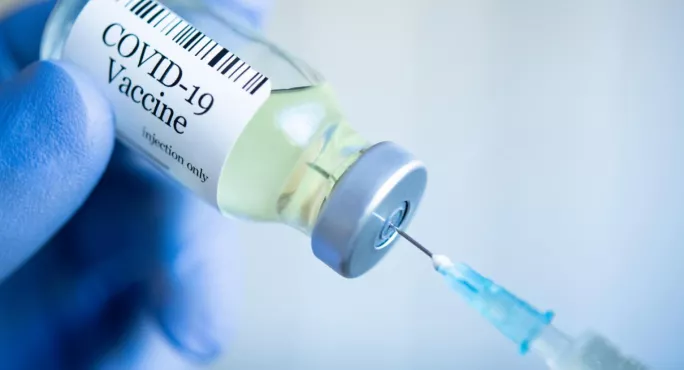
Extend jabs rollout to 12- to 15-year-olds, says expert

The vaccine rollout should be extended to 12- to 15-year-olds as the dominant and more transmissible Delta variant has been “flying through schools”, a public health expert has said.
It comes amid reports that the NHS in England has drawn up plans to start jabbing this age group as pupils return to class after the summer break.
News: Teaching union calls for masks to remain in place in the classroom
Covid: DfE hires advisers to boost attendance this year
Restrictions: School bubbles ‘to be scrapped from 19 July’
The Department of Health has insisted that no decisions have yet been made to extend the vaccine programme to younger people but said it continues “to plan for a range of scenarios”.
NHS trusts in England have been told to prepare for the possible rollout of vaccines to 12- to 15-year-olds from September 6, The Telegraph reported.
The newspaper said trusts are being told that they must have plans ready by 4pm on Friday.
So far, vaccines are being offered to healthy people aged 16 and above, and those considered at risk in the 12 to 15 age bracket.
The Joint Committee on Vaccination and Immunisation (JCVI) has not yet advised on broadening the rollout further.
Devi Sridhar, professor of global public health at the University of Edinburgh, said vaccine advisers are being “very cautious” but warned that “waiting and watching costs time”.
Asked about 12- to 15-year-olds being offered jabs, she told BBC Radio 4’s Today programme: “Either you’re going to be exposed to Covid without any protection or you can be exposed and have a vaccine.
“And we should be offering teens that vaccine so they have that protection before going back into schools.”
Scotland’s deputy first minister, John Swinney, said the return of Scottish schools this term had contributed to a rise in cases in the country.
Professor Sridhar said: “I think the issue is that they (the JCVI) are being very cautious.
“They’re waiting and watching, and I guess the issue with a pandemic is that waiting and watching costs time.”
She said that not jabbing this age group now would mean “they’ve lost that window of time”.
Prof Sridhar added: “It’s an emergency situation and we have Delta, which is so infectious. I mean, it’s just flying through schools, as we know.
“But not just here: Germany, Denmark - even places like New Zealand and Australia - are struggling with Delta compared to the original virus.”
A spokesperson for the Department of Health said: “No decisions have been made on vaccinating 12- to 15-year-olds and it is inaccurate to suggest otherwise.
“Ministers have not yet received further advice from the JCVI on this cohort.
“We continue to plan for a range of scenarios to ensure we are prepared for all eventualities.”
Meanwhile returning secondary school pupils in England are being urged to get tested - and vaccinated, where possible - to stop coronavirus spreading and minimise disruption to lessons over the autumn term.
Ministers are beginning a campaign today, backed by an Olympic champion and a TV doctor, to persuade parents, secondary school and college students to take part in voluntary asymptomatic Covid-19 testing.
Attendance advisers are being recruited to work with local authorities and multi-academy trusts, where absence rates are higher than average.
It comes as an expert advising the government warned that music festivals and schools returning will lead to a “significant surge” in Covid-19 infections.
Unions have called for more action to ensure schools are kept as safe as possible and education is not disrupted further.
The campaign has been endorsed by 18-year-old swimmer Matthew Richards, who won a gold medal at the Tokyo 2020 Olympics, and NHS consultant paediatrician and TV presenter Dr Ranj Singh.
Pupils began returning to school in Leicestershire this week, with most pupils in England set to head back to class over the next fortnight.
Education secretary Gavin Williamson said: “I have every confidence that school and college staff, parents and students will continue to work together admirably, following pragmatic measures like testing and vaccinations to minimise disruption and keep children where they belong - in the classroom.”
Department for Education guidance states that secondary school and college pupils in England should be tested twice on site on their return, with lateral flow tests carried out between three and five days apart.
Pupils should then continue to test twice weekly at home until the end of September, when the policy will be reviewed.
NHS England said more than half a million 16- and 17-year-olds have had their first dose, with efforts continuing to encourage teenagers to get a jab, including revellers at the Reading and Leeds festivals this weekend being offered a vaccine dose at pop-up clinics set up across the two sites.
The Welsh government has asked that parents test their children for coronavirus at least twice a week, regardless of whether they have symptoms or not, once the new academic year starts in September.
All 16- and 17-year-olds in Wales have now been offered the vaccine and 12- to 15-year-olds who are clinically vulnerable will also be offered vaccination before term starts.
You need a Tes subscription to read this article
Subscribe now to read this article and get other subscriber-only content:
- Unlimited access to all Tes magazine content
- Exclusive subscriber-only stories
- Award-winning email newsletters
- Unlimited access to all Tes magazine content
- Exclusive subscriber-only stories
- Award-winning email newsletters
You need a subscription to read this article
Subscribe now to read this article and get other subscriber-only content, including:
- Unlimited access to all Tes magazine content
- Exclusive subscriber-only stories
- Award-winning email newsletters
- Unlimited access to all Tes magazine content
- Exclusive subscriber-only stories
- Award-winning email newsletters